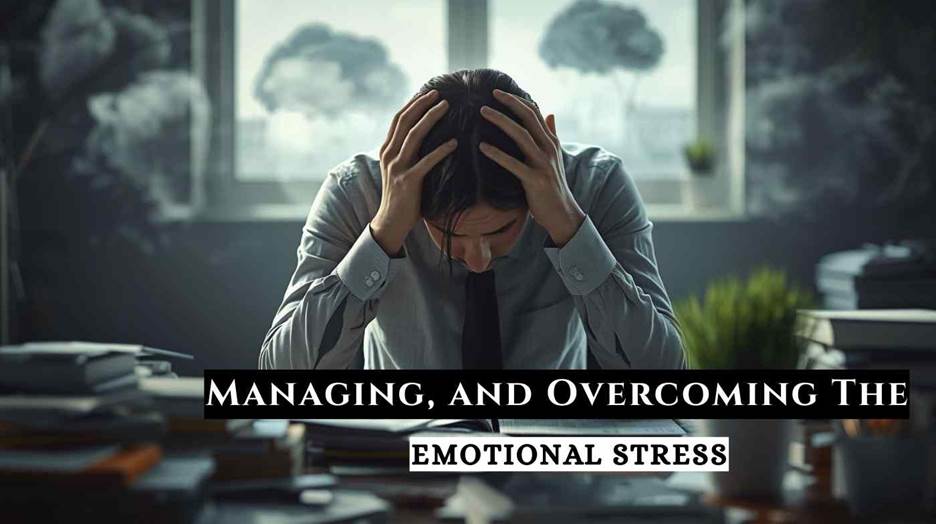Life today moves at an overwhelming pace, and many people silently struggle with emotional stress. Whether triggered by work deadlines, family conflicts, financial worries, or personal setbacks, emotional stress can feel like an invisible weight pressing down on our minds and bodies. Unlike physical stress, which shows itself through fatigue or muscle strain, emotional stress is harder to detect but can have equally powerful consequences on our well-being.
Table of Contents
In this article, we will explore what emotional stress really is, where it comes from, and why it’s essential to recognize its impact. We’ll dive into its psychological and physical effects, discuss the importance of coping strategies, highlight both challenges and benefits of awareness, and provide real-life examples of how people manage stress effectively. By the end, you’ll gain practical insights to handle emotional stress and restore balance in daily life.

What is Emotional Stress?
Emotional stress refers to the psychological strain that occurs when individuals feel overwhelmed, anxious, or unable to cope with life’s demands. It is often triggered by situations that challenge our sense of control, such as major life changes, relationship conflicts, or job insecurity. Unlike temporary nervousness, emotional stress tends to linger and affect thought patterns, mood, and behavior.
Psychologists describe emotional stress as the body’s natural response to perceived threats or pressures. It activates the “fight or flight” system, leading to hormonal changes that increase heart rate, blood pressure, and tension. While this mechanism once protected humans in survival situations, today it often works against us, creating long-term distress.
The Roots and History of Emotional Stress
Stress itself is not new; it has been a part of human existence since ancient times. Early humans experienced stress when hunting, protecting themselves, or surviving natural disasters. However, the concept of emotional stress became more widely studied in the 20th century, particularly through the work of Hans Selye, who introduced the “General Adaptation Syndrome.”
Modern-day emotional stress differs because it is less about physical survival and more about managing constant social, professional, and personal pressures. Technology, fast-paced
lifestyles, and societal expectations have made emotional stress a common experience across all age groups.
Why Emotional Stress Matters
Understanding emotional stress is critical because it directly influences mental and physical health. Unchecked stress can lead to:
- Anxiety and depression
- Insomnia or disturbed sleep
- Weakened immune system
- Heart disease and high blood pressure
- Decreased productivity and focus
Awareness allows people to identify triggers early and take preventive steps. By treating emotional stress seriously, individuals can avoid long-term health complications and improve overall quality of life.
Benefits of Recognizing Emotional Stress
While stress often feels negative, recognizing emotional stress can have unexpected benefits:
- Self-awareness: Helps identify personal limits and boundaries
- Growth opportunities: Teaches resilience through overcoming challenges
- Improved problem-solving: Encourages finding healthier coping strategies
- Stronger relationships: Opens communication when stress is shared and addressed
By reframing emotional stress as an opportunity for growth, individuals can use it to build emotional intelligence and stronger support systems.
Common Challenges of Emotional Stress
Managing emotional stress is not easy, and people often face challenges such as:
- Stigma: Society often dismisses emotional issues as weakness
- Overwhelm: Multiple stressors can pile up, making it harder to cope
- Unhealthy coping: Many turn to overeating, alcohol, or avoidance
- Lack of awareness: Some fail to recognize the signs until symptoms escalate
Recognizing these obstacles is the first step in overcoming them effectively.

Real-World Examples of Coping with Emotional Stress
- Workplace stress management: Companies now promote mental health days, flexible hours, and wellness programs to reduce employee stress.
- Mindfulness practices: Individuals use meditation, deep breathing, or journaling to release emotional pressure.
- Support networks: Talking with friends, family, or counselors helps reduce feelings of isolation.
- Exercise and lifestyle changes: Physical activity, healthy eating, and regular sleep routines are proven to decrease stress levels.
These examples show that while emotional stress is common, effective solutions exist and can be adapted to different lifestyles.
Strategies to Overcome Emotional Stress
To better manage emotional stress, consider these proven techniques:
- Practice mindfulness and meditation daily
- Break tasks into smaller, manageable goals
- Prioritize self-care activities such as exercise, reading, or hobbies
- Maintain strong social connections for emotional support
- Seek professional help when stress feels uncontrollable
Conclusion
Emotional stress is an unavoidable part of modern life, but it does not have to control you. By understanding its causes, recognizing its effects, and adopting healthier coping strategies, you can transform emotional stress into an opportunity for growth and self-discovery. The key is awareness and action knowing when to seek balance and how to implement practical tools. Start small, focus on consistency, and remember that managing emotional stress is not a weakness but a path to stronger mental health and a more fulfilling life.
Pingback: Emotional Flashback: Understanding the Hidden Struggle of Past Trauma - Healthbays-Home
Pingback: Guilt Shame Cycle: Breaking Free from Emotional Traps - Healthbays-Home
Pingback: Emotional Clarity: Mastering Your Inner World for Lasting Balance - Healthbays-Home
Pingback: Emotional Stability: The Ultimate Guide to Building Resilience and Inner Peace - Healthbays-Home
Pingback: The Power of Emotional Intelligence in Everyday Life - Healthbays-Home
Pingback: Mood Balance: A Key to Mental and Emotional Wellbeing - Healthbays-Home
Pingback: Infertility Counseling: Emotional Support for the Journey to Parenthood - Healthbays-Home
Pingback: Vibrant Emotional Health: Simple Ways to Feel Stronger and Happier - Healthbays-Home